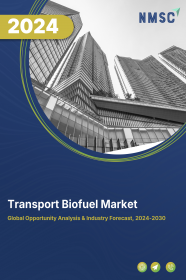
Transport Biofuel Market by Biofuel Type (Biodiesels, Biogas, Biobutanol, and Others), by Process (Biochemical Process and Thermochemical Process), by Raw Materials (Lignocellulose, Jatropha, Camelina, Algae, and Others), by Feedstock Type (Palm Oil, Jatropha, Sugar Crop, Coarse Grain, and Others), and by Application (Land Transport, Shipping, Power Generation, and Others) – Global Opportunity Analysis and Industry Forecast, 2024-2030
Market Definition
The Transport Biofuel Market size was valued at USD 76.90 billion in 2023 and is predicted to reach USD 127.6 billion by 2030 with a CAGR of 7.5% from 2024 to 2030. Biofuel is a fuel that is produced over a short time span from biomass through biochemical and thermochemical processes, which includes ethanol, methanol, biodiesel, biocrude, and methane. This fuel is an energy source that powers various means of transport and are known as transport biofuels.
In addition, using biofuels as a vehicle fuel provides various benefits such as it reduces greenhouse gases, reduces foreign oil dependency, energy efficiency, and improves air quality & the environment. The most popular biofuel used currently is ethanol that is very suitable for running petrol engines. This form of biomass is made from various plant materials and used as a blending agent with gasoline to increase octane, cut down carbon monoxide, and other smog-causing emissions. On the other hand, there are various vehicles that run on biofuels includes Chevrolet Silverado, GMC Sierra, Ford Super Duty, and Ford F150 4WD FFV 2023.
Market Dynamics and Trends
The increasing demand for eco-friendly fuels in road transportation is anticipated to propel the global growth of the transport biofuel market. Biofuels, known for their minimal environmental impact and ability to reduce greenhouse gas emissions, are gaining traction in the transportation sector. As the focus on sustainability and reducing carbon footprint intensifies, the adoption of biofuels is expected to rise, driving the demand for biofuels.
Also, stringent government regulations regarding carbon emissions and a growing focus on sustainable and eco-friendly fuel consumption further drive the market. For instance, in May 2022, the Indian government approved amendments to the National Policy on Biofuels to increase the percentage of ethanol in petrol to 20% by 2025 to 2030. This regulatory change is anticipated to drive the demand for bioethanol blends and propel market growth.
However, the utilization of biofuel production capacity has been discontinued in various nations due to the increase use of gasoline and petroleum consumption, which is expected to restrain the growth of the transport biofuel market. On the other hand, technological advancements, such as the introduction of nano catalyst technology, are expected to create ample opportunities for the transport biofuel market in the coming years. Nano catalysts are widely used for biodiesel production due to their numerous advantages, including chemical stability, affordability, and lower toxicity.
Market Segmentations and Scope of the Study
The transport biofuel market is segmented on the basis of biofuel type, process, raw materials, feedstock, application, and region. On the basis of biofuel type, the market is divided into biodiesels, biogas, biobutanol, and others. On the basis of process, the market is separated into biochemical process and thermochemical process. On the basis of raw materials, the market is alienated into lignocellulose, jatropha, camelina, algae, and others. On the basis of feedstock, the market is segmented into palm oil, jatropha, sugar crop, coarse grain, and others. On the basis of application, the market is classified into land transport, shipping, power generation, and others. Regional breakdown and analysis of each of the aforesaid segments include regions comprising North America, Europe, Asia-Pacific, and Row.
Geographical Analysis
North America holds the dominant share of transport biofuels market and is expected to continue its dominance during the forecast period. This is attributed to the factors such as the rising awareness regarding environmental concerns and government policies aimed at reducing carbon emissions in this region. According to the California Air Resource Board, the U.S. implemented zero emission policy for vehicles 2022. As the demand for sustainable fuel alternatives increases and regulatory measures continue to promote the use of biofuels, the market for transport biofuels in North America is poised for further growth.
Also, the presence of key market players such as Archer Daniels Midland Company, Renewable Energy Group Inc., and Gevo, Inc. among others further drives the growth of the market. These companies play a crucial role in driving advancements, innovation, and market expansion within the aluminum-air battery sector in Asia-Pacific. For instance, Archer Daniels Midland Company announced its plan to launch a sustainable aviation fuel (SAF) by 2026, responding to the growing demand for eco-friendly fuels in the transportation sector. This initiative aims toward cleaner energy sources to reduce greenhouse gas emissions.
On the other hand, Asia Pacific is expected to experience steady growth in the transport biofuel market due to increasing government regulations aimed at promoting the use of biofuels as they reduce greenhouse gas emissions and are considered environmentally friendly. Recently, in September 2022, the Indian government emphasized the use of biofuels such as biodiesel and bio-compressed natural gas (bio-CNG) in the transportation sector. With growing initiatives from the government, the adoption of biofuels is expected to increase significantly in the region.
Also, the increasing emergence of biofuel industries such as GoodFuel and Green Biologics among others is expected to create significant growth of the transport biofuel market in the region. For instance, in August 2022, GoodFuel collaborated with Itochu and effectively supplied sustainable marine biofuel to NYK's bulk carrier MV Frontier Explorer. This partnership aims to establish the supply chain required for the broader adoption of marine biofuel, boosting the widespread adoption of biofuel.
Competitive Landscape
Various market players operating in the transport biofuel market includes Archer Daniels Midland Company, Neste Corporation, Renewable Energy Group Inc, World Energy, LLC, Enerkem, CropEnergies AG, Ineos Group AG, Glencore Magdeburg GmbH, Gevo, Inc., Biowanze SA. These market players continue to adopt various market development strategies including new launches and joint venture to maintain their dominance in the transport biofuel market.
For instance, in August 2021, Archer Daniels Midland Company and Marathon Petroleum Corp entered into a joint venture to produce soybean oil to supply rapidly growing demand for renewable biodiesel fuels along with other opportunities for agriculture to support renewable transportation fuels.
KEY BENEFITS
-
The report provides quantitative analysis and estimations of the transport biofuel market from 2024 to 2030, which assists in identifying the prevailing market opportunities.
-
The study comprises a deep-dive analysis of the transport biofuel market including the current and future trends to depict prevalent investment pockets in the market.
-
Information related to key drivers, restraints, and opportunities and their impact on the transport biofuel market is provided in the report.
-
Competitive analysis of the players, along with their market share is provided in the report.
-
SWOT analysis and Porters Five Forces model is elaborated in the study.
-
Value chain analysis in the market study provides a clear picture of roles of stakeholders.
KEY MARKET SEGMENTS
By Biofuel Type
-
Biodiesels
-
Biogas
-
Biobutanol
-
Others
By Process
-
Biochemical Process
-
Thermochemical Process
-
By Raw Materials
-
Lignocellulose
-
Jatropha
-
Camelina
-
Algae
-
Others
By Feedstock Type
-
Palm Oil
-
Jatropha
-
Sugar Crop
-
Coarse Grain
-
Others
By Application
-
Land Transport
-
Shipping
-
Power Generation
-
Others
By Region
-
North America
-
The U.S
-
Canada
-
Mexico
-
-
Europe
-
The UK
-
Germany
-
France
-
Italy
-
Spain
-
Denmark
-
Netherlands
-
Finland
-
Sweden
-
Norway
-
Russia
-
Rest of Europe
-
-
Asia-Pacific
-
China
-
Japan
-
India
-
South Korea
-
Australia
-
Indonesia
-
Singapore
-
Taiwan
-
Thailand
-
Rest of Asia-Pacific
-
-
RoW
-
Latin America
-
Middle East
-
Africa
-
REPORT SCOPE AND SEGMENTATION:
|
Parameters |
Details |
|
Market Size in 2023 |
USD 76.90 Billion |
|
Revenue Forecast in 2030 |
USD 127.6 Billion |
|
Growth Rate |
CAGR of 7.5% from 2023 to 2030 |
|
Analysis Period |
2023–2030 |
|
Base Year Considered |
2023 |
|
Forecast Period |
2024–2030 |
|
Market Size Estimation |
Billion (USD) |
|
Growth Factors |
|
|
Countries Covered |
28 |
|
Companies Profiled |
10 |
|
Market Share |
Available for 10 companies |
|
Customization Scope |
Free customization (equivalent to up to 80 working hours of analysts) after purchase. Addition or alteration to country, regional, and segment scope. |
|
Pricing and Purchase Options |
Avail customized purchase options to meet your exact research needs. |
KEY PLAYERS
-
Archer Daniels Midland Company
-
Neste Corporation
-
Renewable Energy Group Inc
-
World Energy, LLC
-
Enerkem
-
CropEnergies AG
-
Ineos Group AG
-
Glencore Magdeburg GmbH
-
Gevo, Inc.
-
Biowanze SA




















 Speak to Our Analyst
Speak to Our Analyst

























